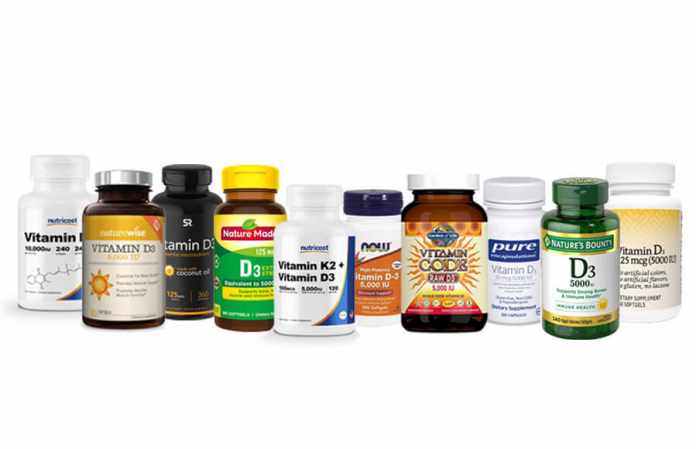Table of Contents
Best Vitamin D Supplement
Their vitamin D is undoubtedly among the essential vitamins for health. It is a fat-soluble Best Vitamin D Supplement vitamin present in the body in two forms:
- Cholecalciferol (Vitamin D3);
- Ergocalciferol (Vitamin D2).
The first is mainly taken with food. The second, also called the sun vitamin, is synthesized by the body itself, primarily through the skin’s exposure to sunlight. A characteristic, the latter, makes it similar to a hormone.
Vitamin D contributes to regulating calcium metabolism, an action that makes it indispensable in bone calcification processes and the presence of diseases such as osteoporosis.
However, it is believed that this vitamin helps protect the body from other diseases and disorders of various kinds.
Let’s see, therefore, to find out what are the beneficial properties of this precious vitamin and which are the best supplements that allow you to provide the right amount.
Properties and benefits of Vitamin D
Vitamin D is essential for its function of allowing calcium absorption, keeping the skeletal system how to clean ears healthy, and preventing bone fractures and osteoporosis.
- It contributes to many other biological functions essential for the survival of the organism. In particular, vitamin D:
- Stimulates the production of endorphins, dopamine, and serotonin, contributing to the well-being of the body and counteracting depressive states;
- Improves the functionality of insulin, the hormone that metabolizes blood sugars;
- Improve muscle tone;
- Protects the cognitive functions of the brain, helping in the prevention of neurodegenerative diseases such as Parkinson’s and Alzheimer’s;
- It stimulates the immune system, which becomes more reactive in the presence of inflammations and infections;
- Decreases high blood pressure, reducing the onset of cardiovascular diseases;
- It helps treat and prevent some skin diseases such as psoriasis, atopic dermatitis, and vitiligo.
Their vitamin d also makes you lose weight because it promotes leptin production, a substance capable of attenuating the stimulus of hunger.
What are the symptoms of vitamin D deficiency?
As we have already said, the primary source of vitamin D for the body is the sun. Unfortunately, for various reasons, this may not be enough, thus causing a state of deficiency.
We think of those who spend a lot of time indoors, those who live in places where it often rains, or, more simply, in the winter months, when the hours of light are few and cold temperatures require more coverage. In these cases, having a vitamin D deficiency is very easy.
The most common symptoms of a lack of adequate amounts of this vitamin in the body include:
- Weaker, sensitive, and prone to caries teeth;
- Muscle aches ;
- Fatigue and weakness;
- Brittle bones and osteoporosis ;
- Psoriasis;
- Weak immune system;
- Irritability and depressive states (because vitamin D stimulates serotonin production, which is the hormone of good mood).
Studies have shown that vitamin D deficiency is often associated with high inflammation markers such as low-calorie food as interleukin-6 and C reactive protein (CRP).
This, of course, could imply the risk of developing cardiovascular disease, osteoporosis, or cognitive dysfunction.
So let’s see how to run for cover by integrating vitamin D into our body.
Foods with Vitamin D: where to find it in nature
In nature, we have seen that vitamin D exists in two forms: cholecalciferol (vitamin D3) and ergocalciferol (vitamin D2).
The first is a vitamin accumulated in the liver mainly through exposure to sunlight and in some foods of animal origin.
On the other hand, the second can be taken through some plant foods that are found on our table. In particular, the foods that contain the most are:
- Fatty fish (tuna, herring, salmon, mackerel, cod liver oil, etc …);
- Milk and derivatives;
- Eggs, especially the yolk;
- Pork and beef liver;
- Green vegetables and mushrooms;
- Dried fruit;
- Beans.
To properly assimilate vitamin D, which we remember has a fat-soluble structure, introduce the right amount of fats in your diet to promote correct absorption.
Furthermore, it is essential to keep food well away from light and heat sources and consume it preferably raw or use cooking methods that are not too aggressive because vitamin D tends to degrade with high temperatures.
If the diet and our regular production were not sufficient for the daily requirement, best meal replacement shakes, it is advisable to take supplements.
Vitamin D: how to take it and recommended doses
According to the Larns (Nutrient Reference Intake Levels), the daily dose of vitamin D varies according to age. For example, 15 mcg each day is sufficient for healthy children and adults (including pregnant and breastfeeding women), while the elderly need at least 20 mcg.
An exposure of about 10-15 minutes to the sun, in the time slot in which the amount of UVB rays is more significant, is always ideal. But in cases of deficiency ascertained by a doctor or specialist, it is advisable to integrate.
To make up for the lack of vitamin D, numerous supplement products are available, mainly based on cholecalciferol that can be taken:
- The oil, orally;
- In drops;
- It can use in soft capsules.
Among the recommended products, there is also the supplement Vitamin D3 Forte by Farma Laboratori. In this case, it is a capsule supplement.
Do you want to keep your bones healthy and your body active and healthy?
Stock up on Vitamin D.
Vitamin D supplements are a valuable ally for the correct absorption of calcium, bone mineralization, and the functioning of your immune system.









